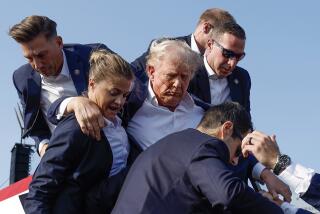Pakistan suicide attack kills 25
- Share via
ISLAMABAD, PAKISTAN — Preelection violence flared Saturday when a suicide bomber struck at a campaign rally in northwest Pakistan, killing at least 25 people and injuring about 50 others, authorities said.
Pakistan has been braced for turmoil as the Feb. 18 parliamentary elections approach. Although violence has been mainly scattered and low-scale so far, officials feared that the bombing in the town of Charsadda, in North-West Frontier Province, could be a harbinger of deadlier attacks as the campaign draws to a close.
Television video of the blast showed the floor of a small assembly hall littered with bloodstained caps, shoes and clothing. Local news reports and hospital officials said several children were among the casualties.
The bombing in Charsadda came hours after police battled hundreds of lawyers and other civil activists in one of the largest clashes of its kind in the capital, Islamabad. Lawyers have been at the forefront of a drive to unseat President Pervez Musharraf, whose popularity has plummeted over the last year.
The protesters threw stones when they were met with volleys of tear gas as they tried to march toward the nearby home of deposed Chief Justice Iftikhar Mohammed Chaudhry, who has been under house arrest for more than three months. Several lawyers, wearing their courtroom garb of black suits, were bundled into police vans, and a number reported being roughed up by police officers.
At the same time, the visiting chairman of the U.S. Joint Chiefs of Staff, Navy Adm. Michael G. Mullen, acknowledged that Islamic militant groups are growing in strength despite a massive infusion of funding from Washington over the last five years to help the Pakistani military fight them.
“The threat is going up -- we’re both concerned about that,” Mullen said after a series of meetings with senior Pakistani military officials, including new army chief Gen. Ashfaq Kiani.
There was no immediate claim of responsibility for Saturday’s bombing, but militant groups based in Pakistan’s tribal lands have threatened all political parties in North-West Frontier Province.
The suicide attack targeted a gathering of the Awami National Party, a secular group representing ethnic Pashtuns. Last week, unidentified assailants in the southern port city of Karachi shot and killed a senior leader of the party, triggering riots by party supporters.
Charsadda, which is near the tribal areas, has been the scene of several recent attacks. In December, more than 50 people were killed when a man blew himself up inside a mosque at the start of a major Muslim festival.
Fear of violence has put a damper on most campaign activity, but Benazir Bhutto’s party Saturday held its first large-scale rally since she was assassinated Dec. 27.
Her husband, Asif Ali Zardari, who has taken over leadership of the Pakistan People’s Party, told a crowd estimated in the tens of thousands that he wanted to carry on his wife’s legacy.
“This is our country, and we have to save it,” Zardari told the crowd that packed a sports stadium in the town of Thatta, in Bhutto’s home province of Sindh.
Before Bhutto’s death, her party had been expected to perform strongly in the parliamentary elections. But many Pakistanis mistrust Zardari because of large-scale corruption attributed to him during Bhutto’s previous terms as prime minister.
--
--
Special correspondent Zulfiqar Ali contributed to this report from Peshawar.
More to Read
Sign up for Essential California
The most important California stories and recommendations in your inbox every morning.
You may occasionally receive promotional content from the Los Angeles Times.













